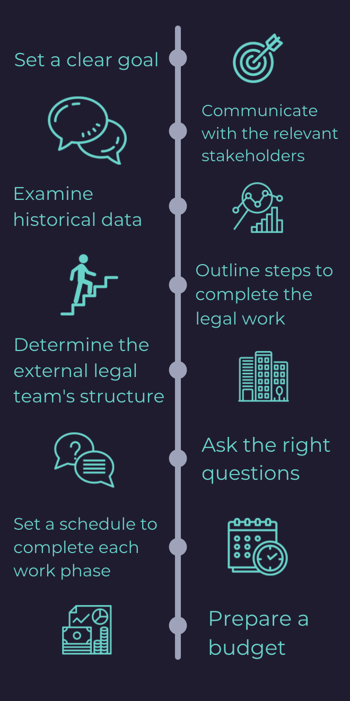
The ability to scope a legal matter accurately is essential to achieving the cost savings that Alternative Fee Arrangements (AFA) offer. While scoping a legal matter is a process commonly associated with AFAs, it has tangible cost and organizational benefits for non-AFA matters.
These benefits include greater cost predictability and savings, improved communication between external counsel and firms, fewer surprises, increased trust, and greater efficiency. This post will help you to scope your matters properly, to garner these benefits and revitalize your legal team.
While this process may seem daunting the first time, your team can quickly replicate the scoping process over and over again once it is established. This can be done by using templates, which streamline the AFA process. The following points are a checklist of steps your team should implement and then replicate to reap the benefits of properly scoping matters.
1. Set a clear goal
If your team sets a clear goal at the onset it will be easier to make informed decisions during the course of the matter, and to measure the matter’s success once complete. While your goal-setting process should obviously encompass cost and budgetary concerns, teams should take time to evaluate broader concerns like what the desired legal outcome is. For example, a transactional team may aim to close an M&A deal by a certain date and a litigation team may attempt to settle a case for the amount covered by insurance. Alongside the legal outcome, counsel may have long-term partnership or relationship goals that should be factored into their evaluation.
Additionally, broader business goals may need to factor into the goal-setting process, such as time constraints or OKRs. Business goals may also encompass a corporation’s diversity initiatives, and inside counsel often have the desire and obligation to engage external counsel that meet their diversity targets. Inside counsel should be clear about their diversity hiring requirements before initiating the matter and use that target to evaluate the resulting bids.
2. Communicate with the relevant stakeholders
Matters typically impact and involve far more parties than the nuclear legal team, and inside counsel should implement a consistent process of notifying relevant stakeholders at the outset of a matter. If your corporation has ESG or corporate governance initiatives it is important to loop in both upstream and downstream individuals. Or your corporation may have a tiger team who will have input on the matter. Here inside counsel should have a reliable and consistent method to update and notify multi-department teams. Other relevant stakeholders may include opposing counsel and non-legal experts associated with a matter like investment bankers, accountants, etc. This communication is beneficial because it can help your team acquire new and relevant information and establish trust amongst stakeholders.
3. Examine historical data
A clear way for your legal team to set accurate goals is to leverage the work your legal department has already done. Past matters are the clearest signal of how a current matter’s variable factors will play out and (assuming your team has done a similar matter in the past) your team should examine them to make realistic goals. Data points like how much the matter cost, how long it took, and whether the desired outcome was achieved are basic factors to take into account. For example, if your team has outsourced a commercial litigation matter before, and is currently dealing with one, your past matter may provide clues on how many depositions you will need to include in your scope. To help quantify the desired work volume, there may be helpful metrics on the number of motions, depositions, experts consulted, etc. in past matters that you should provide to law firms in the RFP.

4. Outline steps to complete the legal work
If your team doesn’t have historicals to refer to, another option may be to look to peers and outside sources to help predict the matter’s steps. In this situation your team should make forward looking predictions and strategize on how to define the scope. The legal team should leverage its network and connect with peers who have worked on comparable matters to learn what to expect. AFA templates (including those housed in PERSUIT’s template library) can provide guidance on the anticipated steps, although these will not be narrowly tailored to your specific circumstance. Finally, other industry organizations like Buying Legal Counsel and CLOC provide resources to help inside counsel outline matters’ steps.
5. Determine the external legal team's structure
The structure of the external legal team will be determined by the priorities and needs of your legal team. Teams should evaluate the complexity and breadth of the matter at hand to evaluate the size and seniority of the outside counsel needed. Additionally, your company’s specific diversity initiatives may impose requirements or preferences for the external team’s diversity. These preferences can be taken into account when communicating with external counsel on the PERSUIT platform.
6. Ask the right questions
Selecting external counsel almost always entails more analysis than just which offer is the least expensive. Your legal team should ask strategic and thoughtful questions to firms to receive RFP responses that help you take all relevant factors into account. The following questions can provide information that your team might otherwise miss:
- What can your firm bring to the table that others can’t?
- Hypothetically, how would your firm approach this matter?
- What other information do you need to provide an accurate price estimate?
- What out-of-scope items are likely to arise in this matter that aren’t currently included in the RFP’ can provide information that your team might otherwise miss?
Additionally, it is important to work with each member of your legal team when undergoing a scoping project to increase buy-in, and subsequently efficiency. Junior and mid-level team members may have valuable insight and priorities that should be taken into account, and giving them the opportunity to ask questions may lead to a better choice of external counsel.
7. Set a schedule to complete each work phase
A schedule should be a no-brainer for your legal team to stay organized from the outset of a matter and ensure seamless communication throughout. Your team’s schedule should include expectations for communication with the law firm and be clear upfront about how much the firm should provide updates. Additionally, in the RFP your team should include any weekly/bi-weekly meetings you plan to have with the firm in the scope so that the law firm can gauge their pricing accordingly. The schedule should include how your team plans to communicate with non-legal teams at your company and any other relevant stakeholders. Finally, legal teams should recognize that your desired completion time is possibly the most important component of making a schedule. If your team needs particular phases (or the entire matter) completed quickly, it may be worth it to pay more for a faster result.
8. Prepare a budget
It goes without saying that cost is one of the most important factors to consider when engaging external counsel. At the outset of the matter your team should evaluate the needs and quality of work the matter requires. Your team may choose to go with a less expensive firm if the matter is routine or less complicated. Alternatively, you may need to evaluate whether a more specialized (and potentially expensive) firm is needed for abnormal or complicated matters where going with the lowest bid may not achieve your goals. However, alternative cost structures like AFAs may help your team achieve more competitive pricing for these matters regardless.
Conclusion
While legal project management can be intimidating for legal teams who have prepared their RFPs somewhat haphazardly in the past, implementing these steps will help your team achieve greater efficiency and cost savings going forward. PERSUIT’s client success team are experts in scoping matters and can help your team leverage proper scoping to meet your goals this year.